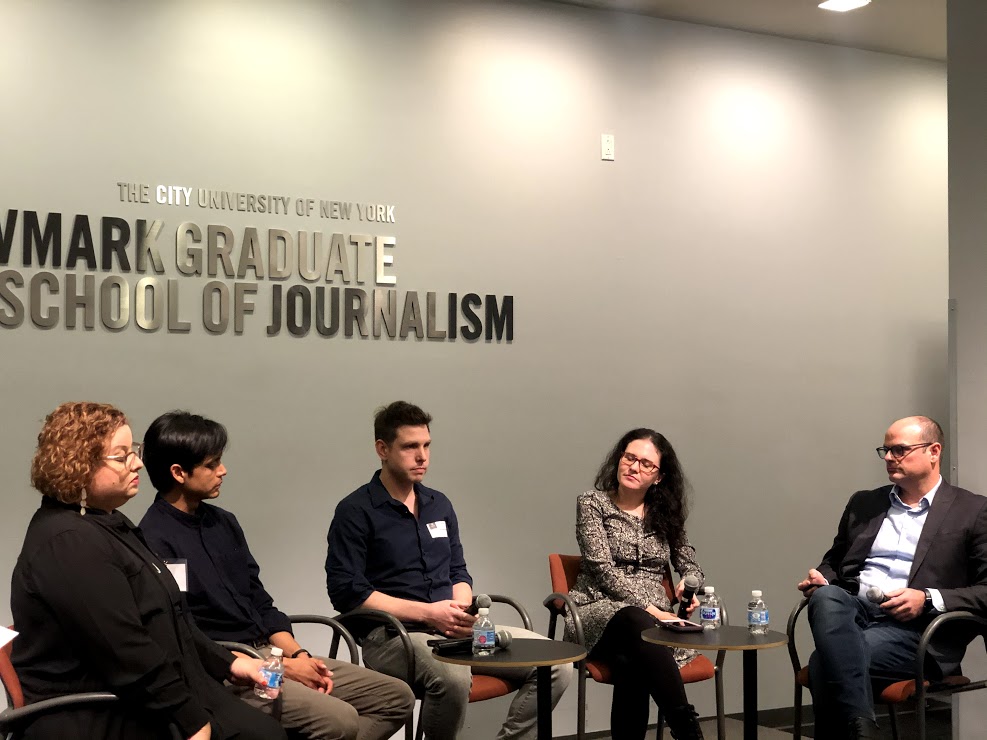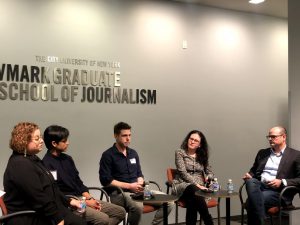

The Craig Newmark Graduate School of Journalism hosted a panel this past week concerning the accountability of reporters tasked with covering Puerto Rico. The panel, replete with an all-star cast of journalists, concerned itself with what stories find Puerto Rico in the spotlight, the failures of many reporters to treat the people with respect, and how we should be covering cockfighting, among other things. In light of recent protests and natural disasters, which have brought unprecedented attention to the island nation, they had gathered there with a united goal: to do better by Puerto Rico.
The panel kicked off with a speech delivered by CUNY Chancellor Felix V. Matos Rodriguez, himself a native Puerto Rican, which set the stage for the following hour long discussion. Matos praised the efforts of the graduate school, which has a Spanish language journalism program (the first of its kind in the country) interested in training bilingual speakers to cover Latinx communities, including Puerto Rico. A special shoutout was given to the Centro de Periodismo Investigativo (The Center for Investigative Journalism) or CPI, for their groundbreaking efforts in uncovering the corruption of former Puerto Rican governor Ricardo Rosselló. When the CPI exposed Rosselló’s misogyny and racism, among other horrific traits, last summer, it sparked protests the likes of which Puerto Rico had never seen, resulting in his resignation.
“This was the modern day equivalent of publishing the Pentagon Papers in the New York Times and it all started from a journalistic mission to expose wrongdoing,” Matos told the packed conference room, highlighting the importance of the work of a journalist. “We need to listen better, care more, and hold our attention just a little more. Well-trained journalists, like the one that the J-school is graduating, are naturals in this line of work.”
After the chancellor’s remarks, the panelists and moderator took the stage. The panelists were Carla Minet from CPI, Patricia Mazzei of the New York Times, Adrian Florido from NPR, and Nick Brown from Reuters; the panel was moderated by NPR’s Luis Trelles. Their conversation centered on the unfortunate conditions that have kept Puerto Rico in the headlines.
“I think unfortunately we’re in sort of a news cycle climate where only the biggest stories compete with the biggest stories,” Mazzei said. “We should go down there when there’s a big story. But then we should also go back to talk about the schools and the cockfighting and you know, the cultural stories. A million other things have also happened.”
She and the other panelists have attempted to cover Puerto Rico in ways beyond just its ugliest moments, but the way the business works can be a restraint.
“How do we keep that storyline being sort of front and center too is hard, because you get three minutes sometimes on the radio,” said Florido, who works for NPR. “You know, you get twelve-hundred words.”
“Four hundred,” Brown murmured. “Ouch,” Trelles interjected. The laugh the room and panelists let out indicated that this was a common source of contention in the newsroom.
Florido is now based out of San Juan, Puerto Rico. Hurricane Maria was what drew him to the island (for work), but it also motivated him to continue pushing for coverage at NPR. The move was welcomed by the leadership, resulting in him spending a year there, granting him the ability to tell a range of diverse stories decidedly not solely focused on the island’s disasters. With this year, he’s been able to understand Puerto Rico’s complicated history, develop relationships with its people, and understand things like its “colonial relationship [and] unequal power dynamic with the United States.”
“You can say it, but you don’t really know what that means, you don’t know what that feels like, you don’t internalize that until you start to have interpersonal relationships on the island,” Florido said. The panel agreed: it’s important to be deeply entrenched in your subject.
This entrenchment is what the recurring cockfighting story is all about. When the U.S. Congress ruled to abolish cockfighting in Puerto Rico, Mazzei and Florido both found that the more interesting story wasn’t the ruling, but the average Puerto Rican’s perspective on it.
“It was a story about Congress deciding this and Puerto Ricans not getting a say,” Mazzei said. “And even people who have no interest in continuing cockfighting in Puerto Rico were like ‘but we sort of wish we had gotten a vote or that somebody had asked us.’”
This became the opportunity to “tell a bigger story through a smaller story,” as Mazzei put it, and diversify the coverage of Puerto Rico.
Reuters’ Nick Brown continued down this line of thinking, opening that “becoming a student of history” helped him avoid cliches and generalization and really relay the stories of Puerto Rico to his audience.
“All of these things are not happening in a vacuum,” Brown said. “All of these things are being exacerbated, if not caused, by events whose seeds were sown decades ago and by the fundamental fact of Puerto Rico’s status.”
Instead of running with the presumptions and stories of Puerto Rico being “cursed” to continually pursue the same narrative, Brown instead picked up a book of the financial history of the nation, and though he found it “dry” he also found that a firmer understanding of its history gave him the context to dig deeper for better, more profound stories.
As the only panelist from Puerto Rico, Carla Minet from CPI perhaps understood more than anyone else how to speak to Puerto Ricans, and how complicated it’s been to be in conversation with them. For her and her team at the CPI, it’s involved not just stories that treat the readership and subjects like humans, but stories that they may not have previously heard before.
While it has always been part of Reuters and Brown’s job to relay the intricacies and less “scintillating” details of Puerto Rico’s history regarding things such as pension, a triple tax exemption, and national debt, that coverage was made for an audience that didn’t necessarily include the island’s inhabitants. Minet and her team quickly found that no one was having these conversations with Puerto Rico itself and so the team made it their mission to.
Speaking about this experience, Minet told the audience, “It has been a learning experience for all of our team to understand very profound issues, you know, pension issues. When have we spoken about pensions before the debt crisis? Never. You know, you wouldn’t see a story about pensions in Puerto Rico…you know regularly or as a developing story.”
This failure to see Puerto Rico as a place with stories worth chronicling, is key to what made this panel stand out, and also key to the failures of many of their peers. Brown opined that American media attention in Puerto Rico ebbed and flowed, only peaking when tragedy struck or political turmoil threatened U.S. interests, furthering the “cursed” or “troubled” narrative, without doing the work to explain why or how any of its troubles had come about, or pushing for resolution. Hearing Mazzei describe how journalists would descend on Miami whenever something happened in Puerto Rico felt like hearing a description of sharks drawn to blood or vultures circling a carcass. And while the panelists all understood this was the nature of their job, there was a tinge of disgust in their voices describing it.
But there’s reason to hope that coverage of Puerto Rico will take a turn for the better. It exists in the individuals on that stage, in that packed and concerned conference room, and in the fact that more and more journalists with ties to these places are coming into the workforce with the will and resolve to tell those stories.
Sitting in that room filled with native Spanish speakers, I couldn’t help but feel like this was still a niche issue, and that it would fall on us to do that hard work for the rest of the world. But hearing the fervor in the voices of the attendants, hearing the panelists themselves outline the issues, and seeing the work they’ve done, inspires some hope that we’ll do better by Puerto Rico.
